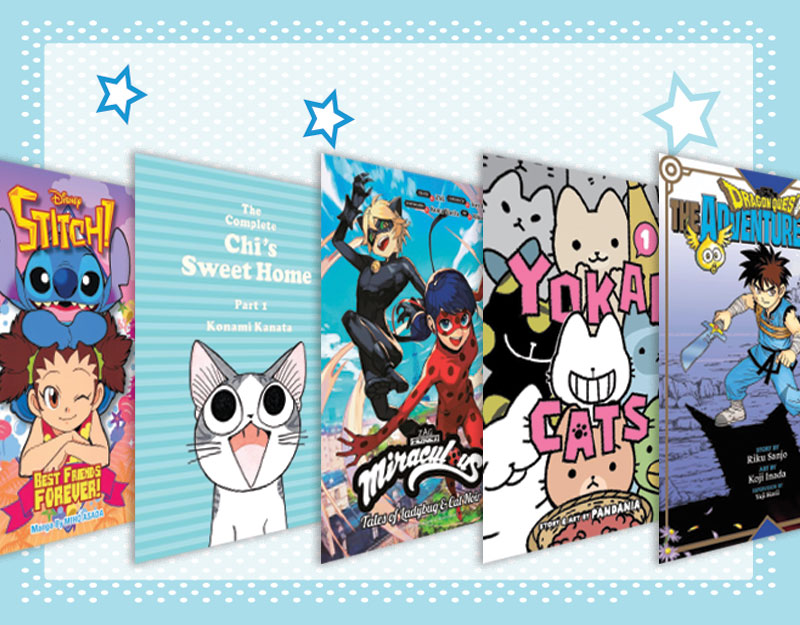Veggie Tattletales: An Interview with Kyle Lukoff About, There’s No Such Thing As Vegetables
It seems a bit appropriate that a mere day after Valentine’s Day, the chocolatest day of the year, I should do an interview with someone about vegetables. Or… wait. Am I interviewing Kyle Lukoff today about vegetables? Or is the very title of his book, nay, his entire PREMISE, There’s No Such Thing As Vegetables?
Now the fact of the matter is that I’ve known Kyle for years and years and years and I’ve a number of reasons to be excited about his latest. First and foremost, it is Kyle. Recent winner of the Children’s Literature Lecture (or, as one wag called it during the ALA YMA telecast, “the homework award”) and Ron DeSantis’s worst nightmare, the man never does the same book twice. This latest? No exception. Another reason I’m excited? Kyle actually puts time into his answers, so when I interview him he’s always the most interesting person to read. Finally, with his latest book he’s been paired alongside the multi-talented Andrea Tsurumi, creator of one of my favorite titles of all time (Accident), and an all around nicer person. Put those powerhouses together and what do you get? An interview with me, obviously.
ADVERTISEMENT
ADVERTISEMENT
Here’s a quick rundown of what the book’s about:
Chester plans to have a salad for lunch, but in order to do that, he’ll need vegetables. So, off he goes to the community garden, except he quickly learns that he won’t be dressing a salad anytime soon. Instead, the vegetables start dressing him down. According to them, “vegetables” don’t exist!
I know what you are thinking: What the bell pepper? Vegetables are totally real! But here’s the thing: Kale is just a leaf, broccoli is a flower, potatoes are roots, and celery…well, stalks. Thanks to a lively, sassy cast of talking “veggies,” Chester learns a valuable lesson about categories and how they shape our understanding of the world.
With a slyly informative text and illustrations that will crack readers up, the schooling in There’s No Such Thing As Vegetables will be easy to digest and is a total treat.
Or, as a particularly clever Kirkus reviewer put it, “Subversion in the salad! Destabilization with dressing! Social constructs fall by the wayside.”
But what, pray tell, does Kyle have to say for himself?
Betsy Bird: Hi Kyle! I’ll jump right into it. In your book DIFFERENT KINDS OF FRUIT, you bring up the idea that there’s no such a thing as vegetables. Then here we are in 2024 and the picture book THERE’S NO SUCH THING AS VEGETABLES is coming out. I’m wracking my brain to think of any other case where some aspect from a middle grade novel got turned into its own picture book (not saying it’s never happened, I just can’t think of any myself). What was the trajectory here? How did this book come to be?
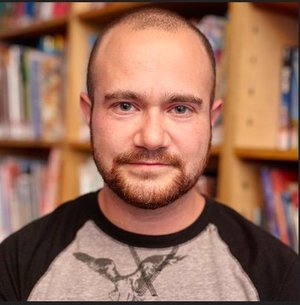
Kyle Lukoff: The story actually goes back further than that! On page 73 in TOO BRIGHT TO SEE, Bug talks about a fight he once had with Moira. “One time, I told her that tomatoes were technically fruits, not vegetables. I’ve always loved fun little facts like that. She insisted that they were vegetables and I tried to explain, in my first-grade-scientist way, that fruit described a part of a plant, and that vegetable was just a made-up category, but she yelled, far too confidently, ‘Then why do you have them in your vegetable garden?'”
So, this has been an obsession of mine for a long time. I had that exact conflict with the girl who inspired Moira, and clearly never forgot it. I think that points toward my process, or lack thereof, as a writer more than anything. If I can’t think of a good fictional conflict, I’ll just write down one I had in real life. A lot of things my characters do, think, like, and dislike, are transposed elements of myself whenever appropriate, which might make me lazy but writing books is hard so I will take the additional help wherever I can get it.
But the trajectory! Basically, early drafts of DIFFERENT KINDS OF FRUIT were titled NO SUCH THING AS VEGETABLES–the earliest draft was titled “Kids These Days” but I knew that was temporary. I really wanted NSTAV to be the final title, but the team at Dial thought that sounded too much like a picture book, so not long after DKOF was published I literally just was like “well, fine, I’ll write a picture book and call it that instead.” So…I did.
BB: Ah, I did something similar once with the name of this blog. In any case, let’s take a step back here now. When, precisely, did you yourself realize that vegetables were a myth?
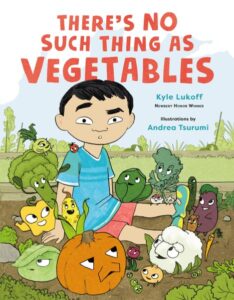
KL: My father was the one who told me that tomatoes were “technically” fruits, but categorized as vegetables, with an interesting side story about the legal status of ketchup and whether or not it counted as a vegetable in school lunches (my parents hated Ronald Reagan). That became a fun fact that I trotted out, but I didn’t know why it was the case, and I don’t think I understood the categories of fruits and “vegetables” until several years ago. You’d think that something so momentous would be seared into my memory, but it felt more like a growing realization about a fundamental truth than a sudden lightning bolt of clarity.
BB: Slow growing realizations never get enough time in the sun anyway. Now I love me a good subversive picture book. Of course, all too often what we call “subversive” just means “upsets expectations”. Which is fine and all, but it sort of undervalues the books that actually know how to get some interesting messaging to their young readers. Would you label THERE’S NO SUCH THINGS AS VEGETABLES as “subversive” or would you give it a different label entirely?
KL: You know, it’s funny, I’ve been joking that it will be a nice change of pace to have a book that’s safe from the book banning movement because it’s not gay or anything. But I also believe that this book is, by far, my most politically radical. I’ve also joked that if picture books had epigraphs, this one’s would be “Every border implies the violence of its maintenance.” (Ayesha A. Siddiqi). I’m not going to label this as “subversive” yet because it hasn’t done anything so far, but I hope it has some impact, somewhere, somehow. Not to spoil the ending, but in the author’s note I talk a lot about social constructions, carefully describing them as made-up categories that have a real impact on the world. I ask readers to consider which social constructs are helpful, which ones are hurtful, and which ones do they have a role in maintaining or breaking down. I want that someday there will be an revolutionary political manifesto that cites this as an early inspiration, but only if it’s a revolutionary political manifesto that I personally agree with. So we’ll see??
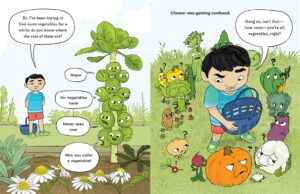
BB: When you envision this book being used with kids, what would be the absolute best use of it? Your dream use?
KL: That it is read aloud by people who relish in coming up with different voices for characters that are funny but not too distracting. I also envision kids coming up with even more creative excuses not to eat their vegetables, and I am sorry about that. I loved vegetables as a kid, still do, and maybe the personified vegetables will inspire vegetable-averse kids into trying their favorite character, at least.
Also, I envision many people–my partner included–saying “I thought there was no such thing as vegetables” every time someone–like myself, asking him what he wants for dinner–refers to that socially constructed category that we all agree has meaning despite its botanic uselessness.
ADVERTISEMENT
ADVERTISEMENT
BB: That first part of your answer belied your children’s librarian training, I could see. Now howzabout that art by Andrea Tsurumi, eh? Did you know Andrea’s work before they got paired with you? How do you like the final product?
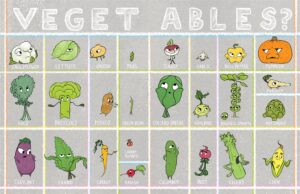
KL: I don’t remember who suggested Andrea first, me or my editor, but as far as I was concerned they were the only artist for this job. I adore one of their early picture books, CRAB CAKE, and wanted them to take their talent with fish and put it toward vegetables. There are so many fantastic characters on every page, they all have so much personality, and I want to be friends with every single leaf, stalk, and root they drew.
BB: Finally, what’s next for you these days? What do you have coming up?
KL: I have so much coming up, I’m very tired. This fall will see the release of two more picture books, JUST WHAT TO DO and I’M SORRY YOU GOT MAD*. My third novel is coming out after that, and in three and a half weeks I’m going to start working on novel #4. And once I’m done with this interview I’m going to dive into revisions for my newest picture book, the 22nd book I’ve sold, which is very much inspired by Shel Silverstein and his slightly melancholy missing pieces and giving trees.
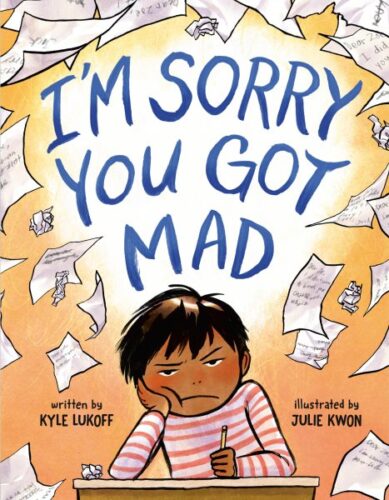
*Title suggested by Betsy Bird
Whew! Lazy thing that I am, I’m exhausted simply reading Kyle’s list of things he has coming up. There’s No Such Things as Vegetables is out February 27th, so be sure to look for it on library and bookstore shelves then! Thanks to Kyle for carving out some time to answer my questions with such loquaciousness, and thanks too to Nicole Banholzer and the Macmillan Kids team for putting this all together.
Filed under: Interviews
About Betsy Bird
Betsy Bird is currently the Collection Development Manager of the Evanston Public Library system and a former Materials Specialist for New York Public Library. She has served on Newbery, written for Horn Book, and has done other lovely little things that she'd love to tell you about but that she's sure you'd find more interesting to hear of in person. Her opinions are her own and do not reflect those of EPL, SLJ, or any of the other acronyms you might be able to name. Follow her on Twitter: @fuseeight.
ADVERTISEMENT
ADVERTISEMENT
SLJ Blog Network
Name That LEGO Book Cover! (#53)
Exclusive: Vol. 2 of The Weirn Books Is Coming in October | News
Fighting Public School Book Bans with the Civil Rights Act
North Texas Teen Book Festival 2024 Recap
ADVERTISEMENT



